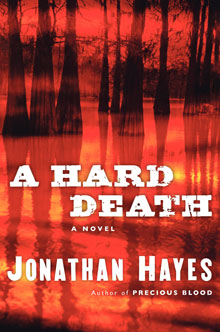
INURED “Death investigators can be harsh,” says medical examiner and mystery author Hayes. |
Forensic scientists, bit players in crime fiction since the era of Sherlock Holmes, became bestseller material in the 1990s with Patricia Cornwell's cut-and-slice procedurals featuring medical examiner Kay Scarpetta. Now, MEs seem to be everywhere — from CSI to HBO's lurid Autopsy to a recent installment of PBS's Frontline about the public-health issues of underfunded state labs.Jonathan Hayes believes that the glut owes more to the 1995 O.J. Simpson trial than to Quincy, M.E. Hayes should know — he's a senior medical examiner for the city of New York, with 25 years of experience. The British-born, Waban-raised Hayes has also created his own fictive forensic-scientist alter ego. In A Hard Death, his second novel, Dr. Edward Jenner — a down-and-out New York City medical examiner exiled to a South Florida resort town — investigates the death of his medical-examiner mentor, and he uncovers a nest of drug corruption among rich and poor alike. Writing A Hard Death allowed Hayes to revisit Miami, where he first trained as a forensic pathologist, and to take some time off from his duties in New York City, where he still works, lectures, and testifies in criminal cases.
Hayes followed in his father's footsteps as a physician and forensic pathologist, and it takes him a moment to recall what shocked him as a trainee. "I did know what an anatomy lab would be like," he says on the phone from his Manhattan office. "What shocked me: the sight and smell of decay. The way a body rots, just the complete discoloration. A body can go dark green, almost blackish. I am a sensitive type, and I had a really hard time with it."
Hayes studied anatomic pathology at Boston University, but he quickly grew bored with biopsies. "It was like sorting animal crackers. Hanging out with medical examiners, every case had a story, a complicated, dramatic, and human story."
He moved to Miami in the late 1980s ("the era of the 'Cocaine Cowboys' ") to complete his training. "What was frequently upsetting was decomposed bodies, in heat, and I have a very good nose, a good sense of smell. When I was doing one of those cases, I would start feeling ill and have to step outside, catch my breath, and then go back in. It took me a few years to get over that. Which is unusually delicate. Forensics tend to be kind of robust, hearty individuals."
Discarded corpses, the victims of gang warfare, ended up in abandoned houses or deep in the Everglades — scenes Hayes re-creates in A Hard Death. What surprised him more than the carnage was the sense that Florida's prosperous towns, including a genteel resort where he worked part-time, neither knew of nor cared about the underworld — or the underclass. "This whole nighttime world — I was always working at night — seemed slightly unreal at times — to me, too."
Callousness is a hazard of the job. "You can become inured. Obviously, some degree of emotional and psychological separation is critical. We work in a setting of nightmarish tragedy every day, and for some people — as in medicine — a kind of humor is a defense mechanism. Death investigators can be harsh."